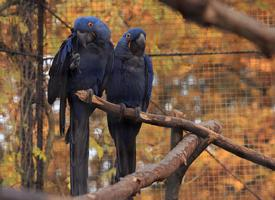
Weights and measures
| Length | 100 cm |
|---|
State of endangerment
| Non Endangered |
Animal description
The Hyacinth Macaw (Anodorhynchus hyacinthinus), often celebrated as the largest macaw and the largest flying parrot species in the world, is a magnificent and captivating bird, primarily distinguished by its striking cobalt-blue plumage and a vibrant yellow ring around its eye. This bird, native to the central and eastern parts of South America, particularly in the vast, open spaces of the Pantanal region, the Cerrado, and the Amazon rainforest, has garnered admiration from bird enthusiasts and conservationists alike.An adult Hyacinth Macaw can reach an impressive length of up to 100 centimeters (39 inches) from the tip of its tail to the top of its head, and it weighs around 1.2 to 1.7 kilograms (2.6 to 3.7 pounds). Its wingspan is equally remarkable, extending up to 120 to 140 centimeters (4 to 4.6 feet), which facilitates its majestic flight across the skies of its natural habitat.
One of the most distinguishing features of the Hyacinth Macaw is its powerful beak. The beak's strength is unparalleled in the bird world, capable of easily cracking nuts and seeds that are too hard for other animals to open. This adaptation is particularly useful since their diet primarily consists of hard-shelled nuts from native palms, such as the acuri and bocaiuva palms. They also consume a variety of seeds, fruits, and, on occasion, vegetation and insects.
Despite its awe-inspiring presence, the Hyacinth Macaw faces several threats that have led to its classification as vulnerable by the International Union for Conservation of Nature (IUCN). Habitat destruction, primarily due to deforestation and the expansion of agriculture, poses a significant threat to their existence. Additionally, the illegal pet trade has had a devastating impact on their populations. These majestic birds are highly sought after as pets due to their striking appearance and sociable nature, leading to over-collection from the wild.
In terms of behavior, the Hyacinth Macaw is known for its sociable and affectionate temperament. They are often observed in pairs or small family groups and maintain strong pair bonds with their mates. Their vocalizations include a variety of squawks and screeches, which can be heard over long distances, serving as communication among individuals and groups.
Conservation efforts are ongoing to protect and preserve the Hyacinth Macaw's natural habitats and populations. These include habitat restoration projects, strict enforcement of laws against illegal trapping and trade, and education and awareness campaigns aimed at local communities and the global population.
In summary, the Hyacinth Macaw is an extraordinary bird, both in appearance and behavior. Its vibrant blue plumage, powerful beak, and sociable nature make it a fascinating subject of study and admiration. However, its existence is threatened by human activities, underscoring the need for concerted conservation efforts to ensure that future generations can continue to marvel at this magnificent species.
Map of occurrence

Similar Animals
New photos of animals
Top 10 animals
- Dolphin gull (Leucophaeus scoresbii)
- Diana monkey (Cercopithecus diana)
- Moustached guenon (Cercopithecus cephus)
- Galápagos tortoise (Geochelone nigra complex)
- Stone loach (Barbatula barbatula)
- Greek tortoise (Testudo graeca)
- Japanese macaque (Macaca fuscata)
- Russian tortoise (Testudo horsfieldii)
- Common flying dragon (Draco volans)
- Galápagos penguin (Spheniscus mendiculus)


